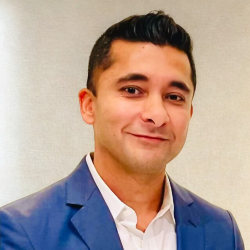Clinical Researcher—April 2025 (Volume 39, Issue 2)
PEER REVIEWED
Emily Gallacher Viall, BSN, RN; Ryan Bowling, MLIS
There is a high likelihood that most of the American medical and research professionals reading this article are currently using a word to describe a woman’s genitalia that is harmful and inaccurate.
That word is “vagina,” and it’s often incorrectly thought of as encompassing a woman’s genitalia, when it is only the internal passage to the cervix and uterus. Conflating “vagina” with the entirety of a woman’s genitalia emphasizes her sexual function in terms of being penetrated and giving birth above all other matters and reduces her importance as a full human being.
Understanding and accurately naming anatomy, such as using “vulva” instead of “vagina,” is only one part of the broader issue. Equally important is addressing the pervasive misuse of the term “sex,” which is often conflated with penetrative intercourse in clinical research and discussions. For many women, vaginal penetration is not a reliable way to achieve sexual pleasure or sexual satisfaction.{1} The vagina is not ultimately that important to many women sexually. De-centering penetration is not heterosexual—it is inherently somewhat queer.
This applies to communities ranging from bisexual to trans masc and trans fem: anyone who might have a vulva, anyone who might have sex with someone who has a vulva, anyone who might serve people who have vulvas, and anyone who might be in community with anyone who has a vulva.
It’s Part of the Job
As medical and research professionals, it is our responsibility to be up to date on the language we use when we are speaking to research participants about sex. It is included in our job description and within our ethical framework to invite open, honest conversations with our participants about the topic of their sex lives. Unfortunately, many of us are products of sex education that isn’t even contemporaneous with developed medicine and education around the world.{2} We have ingrained biases against even using the correct clinical terms or understanding the processes. Except in cases of narrow medical specialties, it’s almost certain those biases are impinging upon, if not entirely preventing, discussion of the broader topic of sex.
Engaging in these discussions requires not only overcoming individual biases but also reevaluating systemic approaches to sex education. Sweden and Denmark have long emphasized inclusivity and practicality in comprehensive sex education. Sweden, for instance, has mandated sexuality education since 1955, integrating it into school curricula to address sexual health and relationships. Similarly, Denmark takes a pragmatic approach, addressing topics such as relationships, sexual health, rights, and gender in a compulsory school curriculum.{3,4}
The Netherlands further exemplifies these inclusive approaches, incorporating comprehensive sex education from a young age and emphasizing consent and mutual respect.{5} Programs like these demonstrate how systemic approaches can shape healthier attitudes and improve research outcomes.
Uganda has also made strides in implementing comprehensive sexuality education programs tailored to young adolescents. These programs aim to equip youth with accurate information and skills to make informed decisions about their sexual and reproductive health, considering cultural contexts and challenges unique to the region. Programs like Uganda’s highlight the importance of integrating cultural sensitivity into sexuality education, ensuring that interventions resonate with local values and challenges.{6}
Sex, Sexuality, Self-Image, and More
We have ample evidence that a cancer diagnosis has a significant impact on a person’s self-image and relationships, which impact sex and sexuality. These side effects, whether direct (such as vaginal dryness) or indirect (like body image changes), affect individuals differently based on their gender.
Gender-specific approaches are essential when discussing sexual health with research participants to address these unique challenges effectively. Male participants may face distinct challenges, such as erectile dysfunction or loss of libido, often underreported due to stigma.{7} Female participants, meanwhile, encounter issues like vaginal dryness or fertility concerns, which are intricately tied to their treatment plans. Recognizing these differences is vital to fostering meaningful dialogue and ensuring comprehensive data collection.
We are granted the privilege of meeting people at the end of their lives, or at the beginning of their lives with a life-changing chronic illness. Failing to address sexual health in clinical research is both unethical and harmful, as it compromises data integrity, participant care, and institutional credibility.
These discussions about sex and reproductive health not only support ethical decision-making but also address systemic challenges in clinical research. Historical cases, such as the exclusion of women of childbearing potential from clinical trials in the 1990s,{8} underscore the critical need for clear policies addressing sexual health. Such policies are essential to prevent adverse events like unintended pregnancies, which can jeopardize participant safety and study integrity. These issues persist globally and warrant nuanced discussion to ensure equitable and effective research practices.
Implications for Research
Neglecting sexual health in research undermines data integrity, increases institutional risk, and restricts insights into participant well-being across medical fields. The implications of purity bias extend beyond oncology into areas such as endocrinology and infectious diseases. For instance, capturing adverse events related to hormonal contraceptives or sexually transmitted infections
provides a more holistic view of participant health. In oncology, the nuances between radiation and chemotherapy’s impacts on sexual health—such as the differential effects on fertility—highlight the importance of tailoring discussions to specific study populations.{1}
Evidence shows that abstinence-only education can lead to higher rates of unwanted pregnancies.{7} For most clinical research studies, a pregnancy is considered a serious adverse event, with risks that impact the participant, the study, and the institution. Talking about sex and pregnancy prevention methods is our opportunity to reduce massive liability. The discussion about contraception should be initiated at the time of consent and followed up on at subsequent visits.
Providing contraceptive resources not only reduces participant burden but also ensures high-quality data collection. ALCOA+ guidelines (attributable, legible, contemporaneous, original, and accurate) guarantee that sexual health data are traceable and reliable, helping researchers identify treatment impacts on participant well-being.{9} For example, ensuring that data about sexual side effects are contemporaneously recorded during clinical trials can help researchers track immediate impacts and improve participant care.
A purity bias is like bringing our individual, subjective Sunday school or church into the healthcare institution and our workplace. This opens up the institution to liability in the form of incomplete data and risk of preventable pregnancy in a clinical trial. We must be comfortable initiating conversations about sex. It takes the burden off the participant; they are the person with the disability, so we should not expect them to bring it up.
Asking about a participant’s sex life and sexual desire (libido) at the baseline adverse events assessment is crucial. This allows researchers to determine whether a treatment is truly having an impact on sexual desire or function and ensures collection of the best possible data for the study. It also allows patients who may be experiencing issues in their sex lives due to the disease or treatment to receive a referral to an appropriate member of the interdisciplinary team to address their concerns. This is palliative care, especially critical for patients who may be at the end of life.
Conclusion
By addressing purity bias, adopting global best practices, and fostering inclusive discussions, clinical researchers can improve data quality, enhance participant care, and advance ethical research outcomes.
References
- Mintz L. 2017. Becoming Cliterate: Why Orgasm Equality Matters—And How to Get It. HarperCollins. https://www.harpercollins.com/products/becoming-cliterate-laurie-mintz?variant=32206247919650
- Guttmacher Institute. 2021. Sex education. https://www.guttmacher.org/fact-sheet/sex-education
- Education Profiles. Comprehensive sexuality education in Sweden. https://education-profiles.org/europe-and-northern-america/sweden/~comprehensive-sexuality-education
- Foss M. 2018. Sexuality education in Denmark’s school curriculum: Tensions between policy and practice. https://foss.stir.ac.uk/2018/06/06/sexuality-education-in-denmarks-school-curriculum-tensions-between-policy-and-practice/
- Katz A. 2024. Sex ed goes global: The Netherlands. Global Reproductive Health at Duke. https://dukecenterforglobalreproductivehealth.org/2018/07/19/sex-ed-goes-global-the-netherlands/
- Kemigisha E. 2019. Process evaluation of a comprehensive sexuality education intervention in primary schools in South Western Uganda. Sexual & Reproductive Healthcare. https://doi.org/10.1016/j.srhc.2019.06.006
- Santelli JS. 2017. Abstinence-Only-Until-Marriage: An Updated Review of U.S. Policies and Programs and Their Impact. Journal of Adolescent Health. https://doi.org/10.1016/j.jadohealth.2017.05.031
- U.S. Food and Drug Administration. 1993. Guideline for the study and evaluation of gender differences in the clinical evaluation of drugs. https://www.fda.gov/regulatory-information/search-fda-guidance-documents/study-and-evaluation-sex-differences-clinical-evaluation-drugs
- ALCOA Principles in Life Sciences and Pharmaceutical Production. https://totallab.com/resources/alcoa-principles/

Emily Viall, BSN, RN, (emily.viall@osumc.edu) is a Clinical Research Nurse at The Ohio State University’s Comprehensive Cancer Center (The James).

Ryan Bowling, MLIS, (cryanb@gmail.com) is an author, editor, and activist with a Master of Library and Information Science degree from Kent State University.



